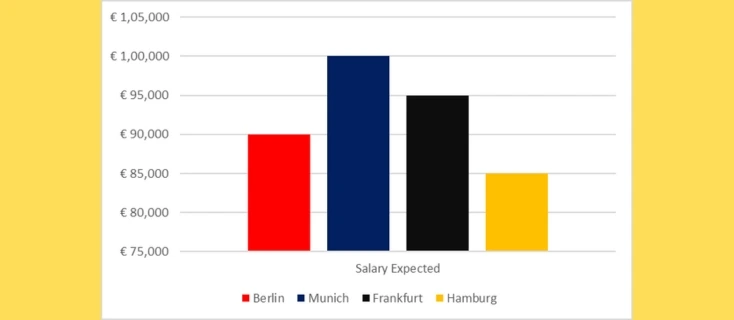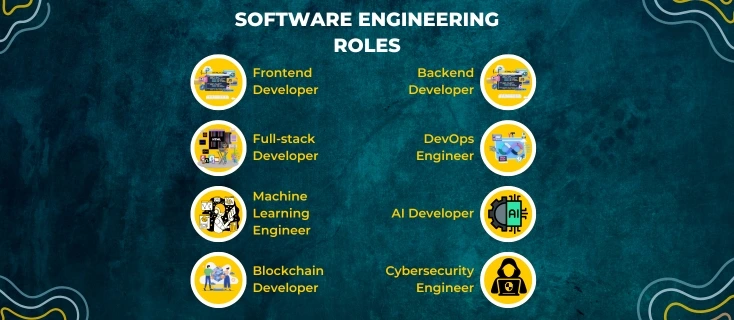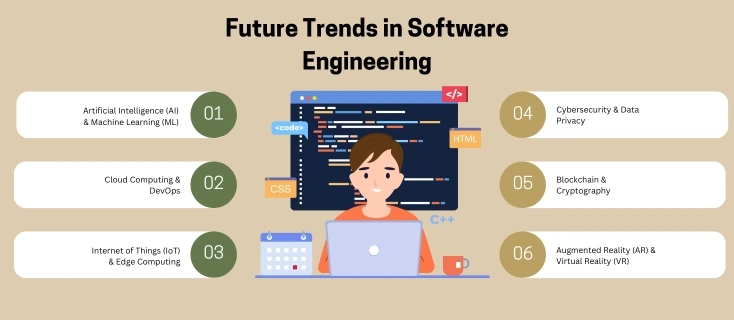When talking about the highest-paying jobs worldwide, software engineering consistently ranks among the top professions, right after surgeons. The demand for skilled software engineers is at an all-time high, especially in technologically advanced nations like Germany. With its booming IT industry, strong economy, and high quality of life, Germany is a prime destination for aspiring software engineers.
This topic provides in-depth information on software engineering in Germany covering salaries, top universities, eligibility criteria, job opportunities, and much more.
Salaries of Software Engineers in Germany
The salaries of software engineers in Germany vary based on experience, city, and company size. Here’s the breakdown:
| Experience Level | Average Annual Salary | Equivalent in INR (1 EUR = 92.72 INR) |
| Entry Level (0 – 2 years) | €45,000 – €55,000 | ₹41,72,400 – ₹50,99,600 |
| Mid-Level (3 – years) | €60,000 – €75,000 | ₹55,63,200 – ₹69,54,000 |
| Senior-Level (6+ years) | €80,000 – €110,000 | ₹74,17,600 – ₹1,01,99,200 |
| Lead/Architect | €110,000 – €150,000 | ₹1,01,99,200 – ₹1,39,08,000 |
Salaries also vary by city:

| City Name | Salary Expected |
| Berlin | €55,000 – €90,000 |
| Munich | €60,000 – €100,000 |
| Frankfurt | €58,000 – €95,000 |
| Hamburg | €55,000 – €85,000 |
Admission Requirements to Get Enrolled into German Universities for Software Engineering
To study software engineering in Germany, students must meet the following requirements:
For a Bachelor’s in Software Engineering
- Completion of high school (equivalent to German Abitur).
- Strong academic background in mathematics, physics, and computer science.
- Proof of German language proficiency (B2/C1 level) for German-taught programs.
- English language proficiency (IELTS 6.5, TOEFL 90) for English-taught programs.
- APS certificate (for Indian students)
- Entrance exams or preparatory courses (Studienkolleg) may be required.
For a Master’s in Software Engineering
- A bachelor’s degree in software engineering, computer science, or a related field.
- Minimum GPA as required by the university.
- Proof of English or German language proficiency.
- Statement of Purpose (SOP) and Letters of Recommendation (LORs).
- Work experience (preferred for some programs)
- APS Certificate
Work Visa and Job Search After Graduation
International students can stay in Germany for 18 months after graduation to find a job. Once employed, they can apply for:
- EU Blue Card: If the salary is above €45,300 per year.
- Permanent Residency (PR): After 33 months of working with an EU Blue Card.
Top Universities for Software Engineering in Germany
Germany has some of the best universities offering software engineering programs. Here are some of the top universities:
| University Name | Program | Ranking (QS 2025) | Tuition Fee (per year) |
| RWTH Aachen University | M.Sc. in Software Systems Engineering | #145 | €600 per semester (semester fee) |
| Technical University of Munich (TUM) | M.Sc. in Software Engineering | #28 | €144 per semester (only semester contribution) |
| University of Stuttgart | M.Sc. in Software Engineering | #347 | Free for EU, – €3,000 per year for non-EU |
| Karlsruhe Institute of Technology (KIT) | M.Sc. in Informatics | #141 | €1,500 per semester for non-EU students |
| Ludwig Maximilian University of Munich (LMU Munich) | M.Sc. in Software Engineering | #54 | Free, except small semester fees (€150) |
| Technical University of Berlin | M.Sc. in Computer Engineering | #159 | €308 per semester (semester fee) |
| Darmstadt University of Technology (TU Darmstadt) | M.Sc. in Distributed Software Systems | #275 | Free for EU, – €1,500 per semester for non-EU |
| University of Freiburg | M.Sc. in Applied Computer Science | #192 | Free for EU, – €1,500 per semester for non-EU |
Curriculum and Subjects in Software Engineering
A typical curriculum of software engineering in Germany includes:
1. Core Courses
- Programming (Python, Java, C++)
- Data Structures and Algorithms
- Databases and SQL
- Computer Networks
- Operating Systems
- Software Architecture
2. Specialized Subjects
- Artificial Intelligence and Machine Learning
- Cybersecurity and Ethical Hacking
- Cloud Computing
- Big Data and Analytics
- Embedded Systems
- Blockchain and Cryptography
3. Project Work
- Industry-based internships with German tech companies
- Capstone projects focused on real-world problem-solving
- Research projects in AI, cybersecurity, IoT, and more
4. Electives
- Web Development and Mobile App Development
- Game Development and Augmented Reality
- DevOps and Continuous Integration/Continuous Deployment (CI/CD)
- Internet of Things (IoT)
- Human-Computer Interaction (HCI)
5. Research Opportunities
- Advanced research in Artificial Intelligence, Robotics, and Quantum Computing
- Participation in EU-funded projects and innovation hubs
- Collaborations with tech giants such as SAP, Siemens, and IBM
Cost of Studying Software Engineering in Germany
The cost of studying software engineering in Germany depends on the university type:
| Components | Details |
| Public Universities | No tuition fees (except semester fees of €150-€350 per semester) |
| Private Universities | Tuition fees range from €10,000 to €20,000 per year |
| Living Costs | Approximately €850-€1,200 per month (includes accommodation, food, transportation, and personal expenses) |
Software Engineering Role and Salary

Here are the roles you can expect after completing your bachelor’s or Master’s from the Software Engineering programs:
| Role | Average Salary Range (Annually) | Skills In Demand |
| Frontend Developer | €50,000 – €65,000 | React.js, Vue.js, Angular, TypeScript, CSS frameworks, UX/UI design understanding |
| Backend Developer | €55,000 – €75,000 | Node.js, Python, Ruby, Java, SQL, MongoDB, RESTful APIs |
| Full-stack Developer | €60,000 – €85,000 | JavaScript, React.js, Angular, Node.js, MongoDB, Express, Python |
| DevOps Engineer | €65,000 – €90,000 | Docker, Kubernetes, Jenkins, AWS, Azure, CI/CD pipelines, Infrastructure as Code |
| Machine Learning Engineer | €70,000 – €100,000 | Python, TensorFlow, PyTorch, Data Science, Natural Language Processing, Deep Learning |
| AI Developer | €75,000 – €110,000 | Python, TensorFlow, Machine Learning, Neural Networks, Computer Vision, NLP |
| Blockchain Developer | €80,000 – €120,000 | Ethereum, Solidity, Smart Contracts, Cryptocurrency, DApps, Cryptography |
| Software Architect | €85,000 – €130,000 | System Design, Architecture Patterns, Cloud Solutions, Microservices, Agile Methodologies |
| Cybersecurity Engineer | €60,000 – €95,000 | Ethical Hacking, Penetration Testing, Firewalls, Encryption, Security Protocols, Risk Management |
Why Choose Germany for Software Engineering?
Germany is a global leader in technology and innovation, making it an ideal destination for software engineers. Here are the prominent reasons why Software Engineering in Germany is the best option for someone looking to Study Abroad.
- Strong IT Industry: Germany has a thriving IT sector, with major companies like SAP, Siemens, and Deutsche Telekom leading technological advancements. The IT industry contributes around €178 billion to Germany’s economy, making it one of the largest in Europe.
- High Demand for Engineers: Germany faces a shortage of over 100,000 IT professionals, creating numerous job opportunities for software engineers. Roles in software development, AI, data analysis, and cybersecurity are in particularly high demand.
- Affordable Education: Public universities in Germany offer tuition-free or low-cost education. More than 400,000 international students study in Germany, benefiting from affordable education and top-tier academic institutions.
- Globally Recognized Degrees: A degree from a German university is highly valued worldwide. Institutions like Technical University of Munich (TUM), RWTH Aachen, and Karlsruhe Institute of Technology (KIT) rank among the best for computer science and software engineering.
- Excellent Work-Life Balance: Germany promotes a healthy work-life balance with a 35-40 hour workweek, paid vacation of at least 20-30 days per year, and strong employee rights.
- Strong Economy and Competitive Salaries: Germany has the largest economy in Europe and the fourth largest in the world. Software engineers earn competitive salaries, with an average annual income of €60,000, going up to €100,000 for senior roles.
- Innovation and Research: Germany is a leader in AI, automation, and IoT, with major companies like Bosch, BMW, and Volkswagen investing heavily in research and development.
- Opportunities for International Professionals: Germany has liberal immigration policies for skilled workers. The EU Blue Card program simplifies the process of obtaining residency and work permits for highly qualified professionals.
- Thriving IT Startups: Berlin, Munich, and Hamburg are home to thousands of startups, offering exciting opportunities in software development, fintech, and AI.
Future Trends in Software Engineering

The field of software engineering in Germany is constantly evolving, with new technologies and methodologies shaping the industry. Here are some of the key future trends in software engineering that will play a major role in Germany and globally:
1. Artificial Intelligence (AI) & Machine Learning (ML)
AI and ML are revolutionizing software development by automating processes, improving decision-making, and enhancing user experiences. AI-powered applications, such as chatbots, recommendation systems, and automated testing tools, are becoming more common in Germany’s tech industry.
Key Technologies:
- Deep Learning Frameworks (TensorFlow, PyTorch)
- Natural Language Processing (NLP)
- Computer Vision
- AI-driven Software Development Tools
2. Cybersecurity & Data Privacy
With the increasing number of cyber threats, cybersecurity has become a crucial aspect of software engineering. Germany, being a tech-driven economy, is investing heavily in cybersecurity solutions, particularly in sectors like finance, healthcare, and government institutions.
Key Areas of Focus:
- Blockchain for Secure Transactions
- Zero Trust Security Models
- AI-powered Cybersecurity Solutions
- GDPR Compliance and Data Protection Laws
3. Cloud Computing & DevOps
Cloud computing is transforming software engineering by offering scalable and cost-effective infrastructure. DevOps practices enhance collaboration between development and operations teams, leading to faster deployment and improved software quality.
Key Technologies:
- Amazon Web Services (AWS), Microsoft Azure, Google Cloud
- Kubernetes & Docker for Containerization
- Infrastructure as Code (IaC)
- CI/CD Pipelines for Automation
4. Blockchain & Cryptography
Blockchain technology is gaining traction in Germany, particularly in financial services, supply chain management, and decentralized applications (dApps). Cryptographic techniques are being used to enhance security and ensure data integrity.
Key Applications:
- Smart Contracts and Decentralized Finance (DeFi)
- Digital Identity Verification
- Secure Voting Systems
- Supply Chain Transparency
5. Internet of Things (IoT) & Edge Computing
IoT is revolutionizing industries such as manufacturing, healthcare, and transportation. Germany, known for its strong industrial base, is leveraging IoT to improve automation and efficiency in factories and smart cities.
Key Trends:
- Smart Homes and Smart Factories
- IoT Security and Data Analytics
- Edge Computing for Low-Latency Processing
- 5G Connectivity Enabling IoT Expansion
6. Augmented Reality (AR) & Virtual Reality (VR)
Germany’s gaming, automotive, and healthcare industries are leveraging AR and VR technologies for immersive experiences and innovative applications.
Key Use Cases:
- Virtual Prototyping in Automotive Industry
- AR for Remote Assistance and Training
- VR in Gaming and Simulation Training
- Virtual Real Estate Tours
Visa and Work Permit Requirements
- Student Visa (for Studying Software Engineering)
To study in Germany, you’ll need:
- Admission letter from a German university
- Proof of financial resources (€10,332 per year)
- Health insurance coverage
- APS certificate (for Indian students)
- Job Seeker Visa (for Finding a Job in Germany)
If you’ve completed a degree in Germany, you can apply for an 18-month job seeker visa to find a job in the country.
- EU Blue Card (for Working Professionals)
The EU Blue Card is issued to highly skilled professionals with a job offer of at least €56,800 per year (€44,304 for IT specialists).
Top Companies Hiring Software Engineers
Several multinational and German-based companies actively hire software engineers:
- SAP
- Siemens
- Bosch
- Deutsche Bank
- Amazon Germany
- BMW (IT Division)
- Microsoft Germany
- Zalando
- Volkswagen IT
- Mercedes-Benz Research & Development
- IBM Germany
How to Become a Software Engineer in Germany

Here is the step-by-step guide if you want to become a Software Engineer in Germany:
Step 1: Choose the Right Educational Path
Software engineers in Germany usually follow these educational paths:
- Bachelor’s Degree in Computer Science or Software Engineering (3-4 years)
- Master’s Degree in Software Engineering or a Specialized IT Field (2 years)
Step 2: Study at a Top University
Here are some of the best universities for software engineering in Germany:
| University | Program | Language |
| Technical University of Munich (TUM) | BSc & MSc in Informatics | English/German |
| RWTH Aachen University | MSc in Software Systems Engineering | English |
| University of Stuttgart | MSc in Computer Science | English/German |
| Karlsruhe Institute of Technology (KIT) | MSc in Informatics | English |
| Technical University of Berlin | MSc in Software Engineering | English/German |
| University of Freiburg | MSc in Applied Computer Science | English/German |
Step 3: Learn the Required Programming Languages and Skills
To become a software engineer in Germany, you should be proficient in:
- Programming Languages: Java, Python, C++, JavaScript, SQL
- Frameworks: Spring Boot, React.js, Angular, Node.js
- DevOps: Docker, Kubernetes, CI/CD Pipelines
- Databases: MySQL, PostgreSQL, MongoDB
- Cloud Platforms: AWS, Azure, Google Cloud
- Agile Methodologies: Scrum, Kanban
Step 4: Improve Your German Language Skills
Although many software engineering jobs in Germany are available in English, learning German can significantly improve your chances of securing a job, especially in non-multinational companies. Aim for at least a B1-B2 level in the Common European Framework of Reference for Languages (CEFR).
Step 5: Find a Software Engineering Job in Germany
Where to Apply?
- Company Websites: SAP, Siemens, BMW IT, Bosch, Volkswagen IT
- Startups and Tech Hubs: Berlin, Munich, Hamburg, Stuttgart
Visa Requirements:
- Job Seeker Visa (Valid for 6 months) if you don’t have a job yet.
- EU Blue Card if you have a job offer with a salary of at least €45,000 per year.
- Work Visa for those who don’t meet the Blue Card salary requirement.
Conclusion
If you’re looking to kickstart your journey in software engineering, Germany should be at the top of your list. Known for being a leader in engineering and technology, the country offers plenty of opportunities for both beginners and experienced professionals. With top universities, a strong economy, and a high demand for tech experts, Germany is the ideal place to grow your career. You’ll not only benefit from great salaries but also enjoy a good work-life balance. Plus, with a booming tech industry and many exciting startups, your career will have endless possibilities. So, if you’re ready to be part of the future of technology, Germany is the place to be. By choosing Software Engineering in Germany, you’re setting yourself up to work in an industry that is both highly respected and rapidly evolving.
Related Post
High demand skills in Germany
Structural Engineering in Germany
Marine Engineering in Germany
Hydro Science and Engineering













